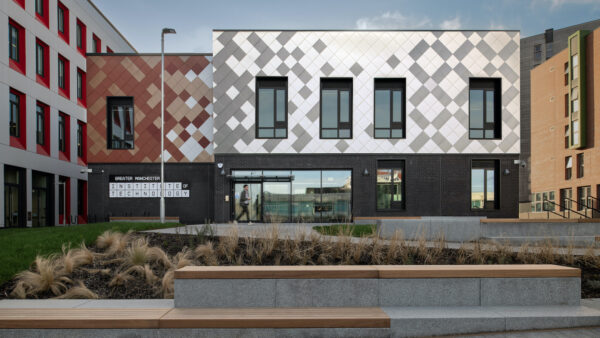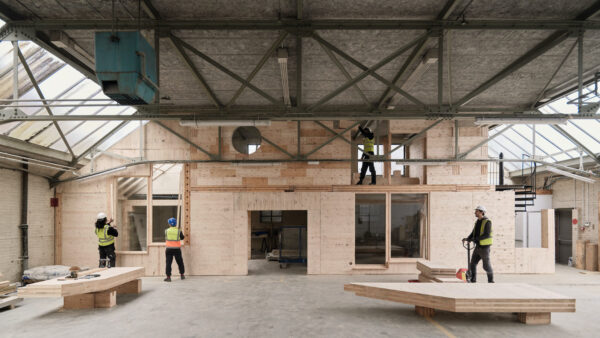
Based on their own experiences of a confrontational culture former contractors Dave Lee and Andy Dean are on a mission to make life in construction calmer, happier and ultimately safer. Denise Chevin reports.
Emma’s had a bad start to the day. Her boiler’s on the blink and there’s no hot water. Roadworks double the time it takes to drive to work. There’s a valuation to finish before the end of the day, but she finds unexpected other tasks in the in-tray. As the day progresses the 35-year-old QS is constantly interrupted with phone calls and gets increasingly frustrated with colleagues. She ends up staying late and arrives home angry.
Recognise the scenario? No? Then you’re one of the lucky ones it seems. For Emma’s scenario is so typical that it’s part of a new training programme to help workers cope with the pressures that many in construction find themselves facing.
The online programme is designed to reduce stress and increase wellbeing. It’s been developed by Brighton-based Dave Lee and Andy Dean, who have six decades of working in the industry between them. They’ve recently given up their day jobs – Lee working as a contracts manager for a groundworks contractor and Dean running his own heating and plumbing business – to set up a new company aimed at changing construction’s culture.
Building Site to Boardroom (BS2B) offers training in how to promote wellbeing among workers. As the title suggests, it’s aimed at anyone from directors to site operatives, and Lee and Dean believe everyone should do it.
Wellbeing workshop
Andy Dean and Dave Lee will be holding a CPD-accredited workshop in Waltham Cross organised by the CIOB Chelmsford Hub on Tuesday, January 17 at 7pm. For more details contact Chia Oh at [email protected]; tel 01344 630840. BS2B can be contacted at [email protected] 020 3151 8455
The initiative arrives as the welfare of the workforce – and not just its safety – is getting more attention. Launching this month at a summit organised by the Health in Construction Leadership Group is Mates In Mind. The initiative’s goal is to train up an army of mental-aid first aiders across the UK’s construction sites.
There is growing evidence pointing to a stressed workforce suffering a range of mental health problems. Surveys suggest that more than 80% of workers in construction suffer from some degree of work-related stress. This can include anxiety or depression and may lead to physical issues such as stomach ulcers and increased risk of heart attack. According to the Samaritans, construction workers are six times more likely to die of suicide rather than a fall.
Lee and Dean say they’ve long perceived an aggressive and destructive culture that runs through construction. For the health – and with it the safety – of the sector to improve, they say it needs to change.
Carving out a better life
Lee, who worked in the groundworks sector for 27 years, has experienced the damage an unhappy work life can bring. With a broken home and tough background he was in and out of jail as a teenager before carving out a better life through construction, rising from labourer to contracts manager. Though he was in well-respected position and married with children, “the pressure got to me”, he says.
He began to drink heavily until his wife issued an ultimatum to clean up or ship out. Sessions with Alcoholics Anonymous started a journey of self-development and culminated in 2013 with him writing the Hairy-Arsed Builder’s Guide to Stress Management.
It was at a workshop that Lee met Dean, also with a background in construction but who’d also retrained as a therapist. Dean began working life as a British Gas engineer but, fed up with the “bullying culture”, left to go travelling in India before returning to train as a therapist and youth worker in the early 1990s.
When grants dried up in the early noughties he went back in to contracting, setting up his own business. By then he was already using the kind of management techniques to try to make life better for those who he worked with. “I’d make time for our employees and encourage them to talk about the day before over a cup of tea. I found if I gave people 20 minutes or half an hour in the morning to unload, they weren’t carrying that throughout their day and they were more switched on, more productive and happier.”

“I’d make time for our employees and encourage them to talk about the day before over a cup of tea. I found if I gave people 20 minutes or half an hour in the morning to unload, they weren’t carrying that throughout their day and they were more switched on, more productive and happier.”
Andy Dean
BS2B and the course was born in response to a series of directives and codes of practice from organisations such as the CITB, the HSE, Considerate Constructors Scheme and the Department of Health, which focused on improving wellbeing and the working environment.
“Construction is changing bit by bit, but there is still a culture of bullying to get things done,” notes Dean.
Their training aims to change this behaviour by teaching people about self-awareness and to be “mindful” of how they behave to those around them. It’s based around what they describe as core values of personal responsibility, integrity, authenticity and equal dignity.
Essentially, that’s about taking control of your own situation rather than allowing yourself to be put upon, acknowledging that everyone’s opinion matters, defining what your boundaries are and sticking to them, and communicating with people in a way that expresses your feelings and needs as clearly as you can.
Using a series of animations, the course guides the user through exercises that teach people how to practise these principles and in doing so learn how to cope with situations at work and at home that in the past have triggered stress and anger. In a nutshell, the pair want people in construction to start being nicer to each other. That way they can be more productive, happier and ultimately safer.
BS2B has partnered with the consultancy Awbery on some of the content and online training provider Olive Media, which has developed the platform. The course has been approved by the CITB and the cost, around £45 per person, can be claimed back through the levy.
They are in talks with several larger contractors interested in buying the programme and have been running pilot schemes with a handful of others. In addition to the online training modules they have also developed material for contractors’ tool box talks, and provide one-to-one coaching or group sessions.
Lee says he has been buoyed by the encouragement they’ve received, including from Joanna Lewis, training partnership manager at the CIOB. She says of the concept: “The safety side of health and safety quite rightly gets a lot of focus, but health is just as important and that is why we are encouraged by initiatives like Building Site to Boardroom.
“CIOB members who have taken this training tell us that it was very valuable and that is why I support Dave and Andy in their approach.”
‘Now I approach things with a calmer attitude’
For 26-year-old QS Tom Fryer, BS2B’s programme has changed his working life.
I’ve always been driven to be a high achiever and I was constantly worried about time. It would make me angry about things I had no control of at work.
It’s not that I have less work now, but I’m dealing with it in a different way. The way I think about it has changed. I realise it’s okay not to know about everything and not feel responsible for other people’s emotions too.
Working in construction you always have deadlines and target dates and you have to be responsible, but it shouldn’t create so much negative energy in the process. Worrying about when you are going to do everything creates an energy in your brain that doesn’t stop. But it makes you inefficient.
The best way I can describe the course is that it’s an additional set of tools which guide your thoughts to a better place.
Now I approach things with a clearer mind and a calmer attitude. You can only do what you can in the time available – and that takes all that defensiveness away. I’m no longer constantly apologising and am more honest and approachable in the way I communicate with people. If everyone applied the values in the course to the way they worked we’d have a much better industry.
Comments
Comments are closed.











This is a great and positive contribution to dealing with the perceived ills of the industry, but how sad that it should come to this? Needing a structured approach to mindfulness and wellbeing is a real indictment of how far our industry has fallen behind those industries who have been innovative and sought a better way of doing business. Education of the top players in the industry is the key, some are already on this journey, but still a long way behind. As a client body, maybe we should push for this type of culture change in the industry and demand it as part of our selection procedures. Interested to hear comments from the industry.
Its great to see Andy and Dave taking a positive approach to improving the culture in construction. I worked on a large public project as the client PM in charge of quality control. We formed the ‘one team’ consisting of 2 different architectural practices, all service engineers – design and delivery, the main contractor’s team (mainly all the QS from all parties), all subcontractors and teams, and finally the client all based in one office as a single team. Although it was very confrontational and mistrustful initially, it was the best project environment where all benefited and felt all parties were getting a fair deal. The main reason being we all understood the restraints / strengths of each other and came together as a single project delivery team. The well being of all participants improved to deliver a cracking project to time cost and quality. I feel more joint approach is what is needed in construction.
A great initiative for the industry.
Projects are hard enough, without the industry making it harder – as it does. If we want to sustainably reduce the levels of personal stress, we also need to tackle the contracting and planning practices that we use. These reinforce the overly aggressive culture that is described in this article, and whilst helping people to cope is a great first step, shouldn’t we also be removing a major cause of the problem too?
I have been using mindfulness techniques for years, before it became more popular and was seen a few years ago as “radical.” However without an understanding from the client or client body, its difficult to become macro from micro in such culture, if the is no authority backing it up on projects, from experience. Equally, talking to professionals, an example, bodies that make their members into CPD log in slaves, seem to have missed the point of mindfulness to its members it seems? Where has trust & respect gone?.. as its a two way stream.